Marine Life & Conservation
Japanese whaling ship rams Sea Shepherd boat in the South Pole after whale slaughter – watch video
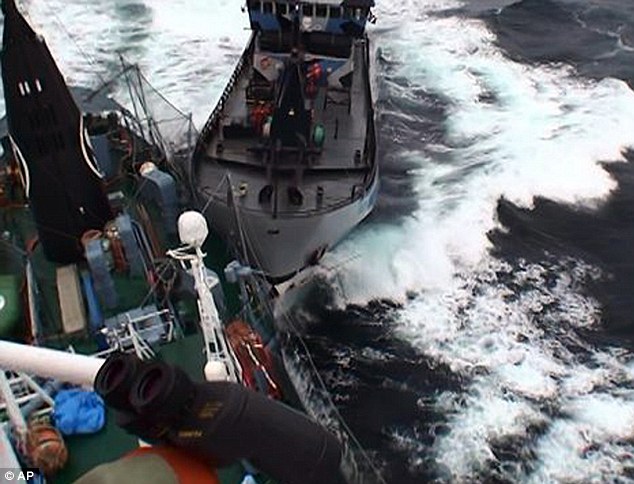
A Japanese harpoon whaling ship has rammed a conservationist protestors’ vessel in dramatic scenes in icy seas off Antarctica.
Video released by anti-whaling organisation, Sea Shepherd, shows the Japanese ship the Yushin Maru 2 crashing into the bow of the Bob Barker last week in the Southern Ocean off the South Pole.
Sea Shepherd claims the collision was deliberate and part of a sustained attack by three whaling ships on the protestors.
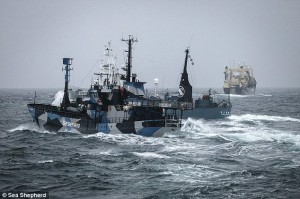 The Sea Shepherd boats, the Bob Barker and the Steve Irwin, were patrolling off Antarctica in the RossSea, the most pristine marine ecosystem on earth in which a high concentration of marine wildlife has remained mostly free from pollution, mining and fishing.
The Sea Shepherd boats, the Bob Barker and the Steve Irwin, were patrolling off Antarctica in the RossSea, the most pristine marine ecosystem on earth in which a high concentration of marine wildlife has remained mostly free from pollution, mining and fishing.
Known as “the last ocean”, the RossSea teems with large predatory fish, whales, seals and penguins.
The Sea Shepherd vessels had sailed to the Ross Sea to interfere with a Japanese whaling fleet comprising the Yushin Maru, Yushin Maru 2, Yushin Maru 3 and the world’s only whaling factory ship, the Nisshin Maru.
Sea Shepherd claims the Japanese ships launched a sustained eight hour attack from around 1am Australian Eastern Daylight Time (AEDT) on Sunday 2nd February.
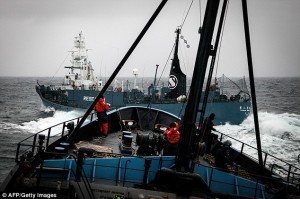 Sea Shepherd said its ships had positioned themselves off the Nisshin Maru’s slipway to block the harpoon vessels from loading the corpses of whales they had caught onto the factory ship.
Sea Shepherd said its ships had positioned themselves off the Nisshin Maru’s slipway to block the harpoon vessels from loading the corpses of whales they had caught onto the factory ship.
The Nisshin Maru is chartered by Japan’s Institute of Cetacean Research (ICR), which claims to be a nonprofit research organization of whales and dolphins, but which Sea Shepherd and Greenpeace say is just a Japanese Government-funded operation for slaughtering whales for profit.
In the attack, which continued until 9am, the harpoon vessels overtook the Sea Shepherd ships, crossing their bows and coming within three to five metres in numerous “dangerous manoeuvres”, Sea Shepherd claimed.
It said the Yushin Maru 3 struck the Bob Barker and quoted the ship’s captain, Peter Hammarstedt, and Siddarth Chakravarty of the Steve Irwin saying the two ships on several occasions had to steer out of the harpoon whalers’ paths, narrowly avoiding potential collisions.
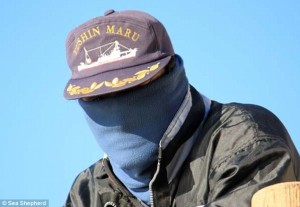 ‘The whaling vessels also made consecutive attempts to foul the propellers of the Sea Shepherd ships by dragging steel cable across the bow of the conservation ships,’ Sea Shepherd said.
‘The whaling vessels also made consecutive attempts to foul the propellers of the Sea Shepherd ships by dragging steel cable across the bow of the conservation ships,’ Sea Shepherd said.
Greenpeace claims the Nisshin Maru has twice rammed its vessel, the Arctic Sunrise, although the Institute for Cetacean Research contested Greenpeace was to blame.
ICR says on its website Greenpeace and Sea Shepherd engage in dangerous ‘sabotage’ which endangers life at sea.
‘Sea Shepherd group, one of several Greenpeace offshoots, joined the interference against Japan’s whale research and, imitating Greenpeace methods such as illegal boarding and ramming of research vessels, started to use increasingly dangerous and violent sabotage methods which include entangling devices (propeller foulers), throwing and shooting of chemical-containing projectiles, smoke bombs and incendiary devices,’ ICR said.
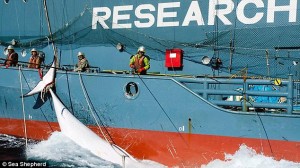 ‘Such dangerous actions by these groups are not peaceful protest but unforgivable acts akin to terrorism that threaten human life at sea.
‘Such dangerous actions by these groups are not peaceful protest but unforgivable acts akin to terrorism that threaten human life at sea.
‘Over and over again we have strongly condemned the harassment and sabotage actions by these groups and demand again that they refrain from further spreading violence under pretext of protecting whales.’
Sea Shepherd’s team of volunteers from around the world has photographed the ICR’s harpooning of whales, and slaughter of dolphins in the Japanese port of Taiji.
Australian Alana West told of the scene at Taiji last year, when the Japanese team herded a pod of striped dolphins into Taiji Cove and how she could hear ‘the distress cries of the dying pod members’.
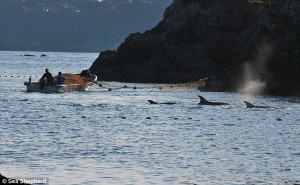 ‘Although the noise and confusion of the killing must have been terrifying for these dolphins, they did not swim to the other end of the Cove, as they so wanted to be with their pod members who were in fear and pain and were taking their last breaths,’ Alana said.
‘Although the noise and confusion of the killing must have been terrifying for these dolphins, they did not swim to the other end of the Cove, as they so wanted to be with their pod members who were in fear and pain and were taking their last breaths,’ Alana said.
‘It was incredibly harrowing to witness.’
Source: www.dailymail.co.uk
Here is the video:
[youtube id=”7QCKpq15qTI” width=”100%” height=”400px”]
Marine Life & Conservation
Paul Watson Released as Denmark Blocks Japan’s Extradition Bid

Renowned anti-whaling activist Paul Watson has been released from custody in Greenland after spending five months in detention. Denmark’s Justice Ministry rejected Japan’s request for his extradition, citing insufficient guarantees that his time already served in custody would be credited against any potential sentence.
The 74-year-old Canadian-American was arrested on July 21 in Nuuk, Greenland’s capital, when his ship docked to refuel. His arrest was based on a 2012 Japanese warrant related to a 2010 encounter in Antarctic waters. Japan alleged Watson obstructed operations and caused damage to a whaling research ship during efforts to disrupt illegal whaling. Watson has consistently denied these claims, maintaining his commitment to marine conservation.
Denmark, which oversees extradition matters for Greenland, concluded that while the legal conditions for extradition were met, the lack of assurances from Japan regarding time-served credit made extradition untenable.
In a video shared by his foundation, Watson expressed gratitude and relief, saying, “After five months, it’s good to be out… and good to know they’re not sending me to Japan.” He added that the most difficult part of his time in custody was being separated from his two young sons.
Watson is a pioneering figure in marine conservation, known for founding the Captain Paul Watson Foundation in 2022 after decades of activism with the Sea Shepherd Conservation Society. His bold efforts to defend marine life have earned him widespread support, including from celebrities and conservationists. His work has also been featured in the acclaimed reality TV series Whale Wars.
Watson’s lawyer, Jonas Christoffersen, praised the decision, stating, “We are happy and relieved that Paul Watson is now free.” He added that Watson is eager to reunite with his family and continue his vital work.
The arrest occurred while Watson’s vessel, the M/Y John Paul DeJoria, was en route to the North Pacific with a team of 26 volunteers to intercept a Japanese whaling ship. His foundation described the arrest as politically motivated and emphasized that Watson’s actions were focused on ending illegal whaling practices.
Japan resumed commercial whaling in 2019 after leaving the International Whaling Commission, asserting that whale meat is a cultural tradition. Conservationists, however, continue to challenge these practices, highlighting their impact on marine ecosystems.
Despite the challenges, Watson remains steadfast in his mission to protect marine life and bring attention to whaling practices. His dedication to ocean conservation has made him a globally respected advocate for the environment.
Marine Life & Conservation
12 Days of Zero-Waste Fish-mas

This holiday period, the Marine Conservation Society, the UK’s leading ocean membership charity, invites you to make some simple changes to eating fish this Christmas to help our seas.
Dr Kenneth Bodles, Head of Fisheries and Aquaculture at the Marine Conservation Society, said, “During the festive season, our consumption increases, but so does waste. Sustainability isn’t just about where food comes from – it’s also about how you use it. By reducing waste and making the most out of your seafood, you’re not only taking steps to be more ocean-friendly, but can also help to cut costs during what is often one of the most expensive times of the year”.
The Marine Conservation Society has compiled twelve tips on how to consume seafood sustainably with zero-waste this Christmas:
Buy whole fish instead of fillets
Instead of fillets, consider buying whole fish such as salmon, hake, or lemon sole. By adopting a “nose to tail” approach with cooking, whole-baked fish not only feeds a crowd, but also helps to minimise waste and maximise sustainability by using up every part of the animal, including bones, skin, and fat.
Make fish stock
Leftover fish bones or shells can be put to good use by boiling them to make a nourishing fish stock or bisque. This can be frozen and preserved for later use and makes for a flavourful base in a soup.
Make your own fish pâté
Avoid waste by turning leftover fish, such as smoked mackerel or salmon, into a delicious pâté by blending with cream cheese and lemon. Perfect when paired with crackers.
The sustainability of salmon and mackerel varies depending on where and how it is caught or farmed. For more information on green-rated options, check the charity’s Good Fish Guide.
Buy frozen
By purchasing seafood that is frozen or vacuum-packed, this helps to reduce waste by extending the shelf life of your food.
Fish pie
If you’re wondering what to do with leftover cooked fish, why not opt for a classic fish pie with mashed potatoes, leeks, and a cheesy sauce? A sure crowd pleaser on Boxing Day.
Use the head
Don’t forget the fish head! The meat is incredibly tender and flavourful. The charity recommends a cod’s head curry or recreating Fallow’s renowned cod’s head in siracha butter.
By stretching your ingredients further, not only is this a more sustainable way to enjoy seafood, but also cost-effective by repurposing leftovers and cooking creatively.
Boxing Day brunch
Mix leftover kippers or smoked salmon with scrambled eggs for a tasty, zero-waste, Boxing Day brunch.
For best choice, make sure you buy kippers, or herring, from the North Sea and the North Irish Sea.
Zero-waste storage
A top tip from the Marine Conservation Society to avoid waste is freezing fish offcuts to save for future use.
Crisp up the skin
Even leftover fish skin can be turned into a quick savoury snack by crisping it up in an air fryer with a little olive oil and salt.
Anchovies two ways
Leftover anchovies can either be blended with butter to make a delicious anchovy butter or tossed into pasta for a hit of umami flavour.
The charity recommends opting for anchovies caught in the Bay of Biscay for best choice.
Fishcakes
For an easy, zero-waste meal, leftover seafood trimmings can be mixed with mash and fried in breadcrumbs to make fishcakes.
Pickled mussels
Try pickling mussels in 1:1 vinegar and water, with a dash of sugar for a sustainable, zero-waste snack that can be enjoyed well beyond the festive season.
Mussels farmed in the UK are a seafood superhero. Grown using low-impact methods and harvested by hand, they get all the food they need from the sea around them. This makes them one of the most sustainable, ocean-friendly, and cost-effective seafood options.
Players of People’s Postcode Lottery have raised £6.6M towards the Marine Conservation Society’s vital work in making seafood more sustainable.
Laura Chow, Head of Charities at People’s Postcode Lottery, said: “Fish is a festive favourite for many, but making sustainable choices when it comes to how we buy and eat seafood makes all the difference for our ocean. Support from players of People’s Postcode Lottery has helped the Marine Conservation Society further its sustainable seafood work, so that we can all enjoy healthier, better protected seas.”
The Marine Conservation Society encourages you to make sustainable seafood choices a year-round habit, not just for Christmas. To check how sustainable the seafood on your plate is, you can visit the charity’s Good Fish Guide. The Guide helps consumers and businesses identify the most sustainable seafood using a simple traffic light system, based on where and how species are caught or farmed. Green is the best choice, amber means improvements are needed, and red indicates fish to avoid buying.
Zero-waste gift idea
Why not embrace a zero-waste Christmas by gifting a membership to support marine conservation? It’s a meaningful, low-waste gift that helps protect our ocean for generations to come. Memberships start from as little as £5 a month – the price of a sandwich and drink from your local coffee shop.
Find the latest sustainable seafood advice for wild-caught and farmed seafood on the Good Fish Guide, downloadable to your phone from www.mcsuk.org/goodfishguide.
-

 News2 months ago
News2 months agoIconic SS United States to become the World’s Largest Artificial Reef
-

 News3 months ago
News3 months agoBook Review – 52 Assignments: Underwater Photography
-

 Gear News3 months ago
Gear News3 months agoDYNAMICNORD – New German diving brand enters the British market
-

 News3 months ago
News3 months agoExploring Cenote El Pit: A Diver’s Dream
-

 Gear News3 months ago
Gear News3 months agoTry BARE drysuits (and maybe even win one!) this Friday with Sea & Sea at North West Dive Fest
-

 Marine Life & Conservation3 months ago
Marine Life & Conservation3 months agoBook Review: Coral Triangle Cameos
-

 Blogs2 months ago
Blogs2 months agoDive the Egyptian Red Sea this Autumn with Regaldive
-

 News3 months ago
News3 months ago2024 Ocean Art Underwater Photo Competition Announced















